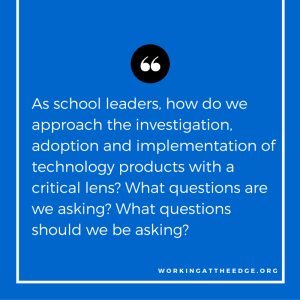 When you attend a conference or other learning experience, do you make time to debrief? Reflection is where the learning takes place, so remember to book that time! After a hackathon at Voxer we spend a good deal of time in the afternoon reflecting on what we have taken in this week so far. In this post I reflect on the hackathon and document the questions that are emerging from our work this week.
When you attend a conference or other learning experience, do you make time to debrief? Reflection is where the learning takes place, so remember to book that time! After a hackathon at Voxer we spend a good deal of time in the afternoon reflecting on what we have taken in this week so far. In this post I reflect on the hackathon and document the questions that are emerging from our work this week.
Prior to the hackathon at Voxer, I had no idea what a hackathon actually involved. I learned that it is basically an event where people come together to collaboratively solve a problem. Our #PennSV16 team focused on two hacks: How can we use Voxer in the @MCDPEL program in ways that break down walls between individuals, teams, cohorts, alumni and faculty? How might we use Voxer in the classroom to connect learners asynchronously across the globe? Each group spent about a half hour (a period of time far shorter than a full hackathon) to iterate various solutions and then share them out to the whole group. Our team will be posting a separate blog about our hack in the near future!
In the afternoon, we spent a good deal of time unpacking and reflecting on our experiences over the course of the week. The real learning occurs in this space, and it’s important that we made the time for this valuable work. During this period I was able to hone in on some broad questions which I’ll develop into future work, conversations and blog posts.
- We are seeing a lack of rich educational background in those working in start-ups. What is the knowledge of classroom/school practice and research that is behind the work they do? As school leaders, how do we approach the investigation, adoption and implementation of technology products with a critical lens? What questions are we asking? What questions should we be asking?
- Do school leaders have sufficient knowledge of technology and how particular tools align with a vision for learning? Do they know how to engage stakeholders in conversations around the use and procurement of technology tools and hardware? To do this successfully is to exercise true digital leadership. Digital leadership is more than saying, “yes” to using Twitter to tell your school story.
- How do we move the conversation beyond the surface level – simply focusing on the shiny hardware and the flashy apps? How does the tech/app connect with our beliefs about learning? What is our concept of learning and how progressive or conservative is it?
- Many tech start-ups are (intentionally or not) leaving school leadership out of the conversation. Feedback loops and conversations typically happen with teachers and parents. School leaders are integral to scale and sustainability. Is the lack of focus on school leadership a business strategy or is there some other motivation?
- Start-ups model the inquiry process – finding a problems and developing solutions, in iterations, to solve the problems. What if schools embraced this process?
Lots of rich questions to turn into a few future blog posts!
What role should school leadership play in the procurement and evaluation of technology hardware and software?
Connect with #PennSV16 on Twitter and on Voxer. Connect with Randy on Twitter and on the TLTalkRadio podcast!
Get new content delivered to your inbox and the ebook 3 Key Principles of Digital Transformation. The ebook contains valuable information from my experience leading a digital transformation and working with a variety of stakeholders over the past decade.
- A silver lining - January 22, 2022
- Is our use of tech working against us? 🤔 - September 8, 2021
- What’s NOT going to change in the next 10 years? 🤔 - September 7, 2021